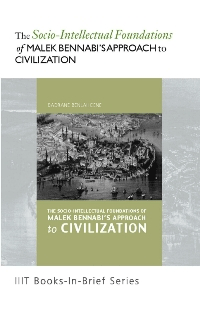
- Badrane Benlahcene
- The International Institute of Islamic Thought (IIIT)
- 2013
- 32
- 8589
- 3111
- 3276
The Socio-intellectual Foundations of Malek Bennabi’s Approach to Civilization
Since the publication of Samuel Huntington s The Clash of Civilizations concern about civilization has been reintroduced into the debate on the world order.
Malek Bennabi (1905 1973), prominent Algerian thinker and great Muslim intellectual, intently focused on unraveling the causes of Muslim decline and the success of Western civilization and culture. The key problem he theorized lay not in the Qur’an or Islamic faith but in Muslims themselves. The author investigates Bennabi s approach to civilization and the fundamental principles drawn, using metatheorizing methodology.
In doing so he sheds further light on perhaps one of the more intriguing elements of Bennabi s theory, that civilization is governed by internal-external and social-intellectual factors and that an equation can be generated for civilization itself. This equation of Man+Soil+Time = Civilization and of which religion, according to Bennabi, forms the all-important catalyst, is explained and its significance in terms of the reversal of Muslim decline evaluated. What is clearly apparent is that for Bennabi, Man is the central force in any civilizing process and without him the other two elements are of no value. With regard to outcomes, Bennabi s unerring conviction that unless Muslims changed their spiritual condition they could not effect any far-reaching, meaningful change in society is echoed in the Qur’anic verse: Verily, never will Allah change the condition of a people until they change what is in themselves (13:11).
Since the publication of Samuel Huntington s The Clash of Civilizations concern about civilization has been reintroduced into the debate on the world order.
Malek Bennabi (1905 1973), prominent Algerian thinker and great Muslim intellectual, intently focused on unraveling the causes of Muslim decline and the success of Western civilization and culture….
Source: noor-book











 Afar
Afar Afrikaans
Afrikaans Akan
Akan Albanian
Albanian Amharic
Amharic Armenian
Armenian Assamese
Assamese Avari
Avari Azerbaijani
Azerbaijani Basaa
Basaa Bengali
Bengali Bosnian
Bosnian Brahui
Brahui Bulgarian
Bulgarian Burmese
Burmese Catalan
Catalan Chami
Chami Chechen
Chechen Chichewa
Chichewa Circassian
Circassian Comorian
Comorian Czech
Czech Danish
Danish Dutch
Dutch Estonian
Estonian Finnish
Finnish Fulani
Fulani Georgian
Georgian Greek
Greek Gujarati
Gujarati Hausa
Hausa Hebrew
Hebrew Hungarian
Hungarian Icelandic
Icelandic Indonesian
Indonesian Ingush
Ingush Japanese
Japanese Jawla
Jawla Kannada
Kannada Kashmiri
Kashmiri Katlaniyah
Katlaniyah Kazakh
Kazakh Khmer
Khmer Kinyarwanda
Kinyarwanda Korean
Korean Kurdish
Kurdish Kyrgyz
Kyrgyz Latvian
Latvian Luganda
Luganda Macedonian
Macedonian Malagasy
Malagasy Malay
Malay Maldivian
Maldivian Maranao
Maranao Mongolian
Mongolian N'ko
N'ko Nepali
Nepali Norwegian
Norwegian Oromo
Oromo Pashto
Pashto Persian
Persian Polish
Polish Portuguese
Portuguese Romani - gypsy
Romani - gypsy Romanian
Romanian Russian
Russian Serbian
Serbian Sindhi
Sindhi Sinhalese
Sinhalese Slovak
Slovak Slovenian
Slovenian Somali
Somali Swahili
Swahili Swedish
Swedish Tagalog
Tagalog Tajik
Tajik Tamazight
Tamazight Tashamiya
Tashamiya Tatar
Tatar Thai
Thai Tigrinya
Tigrinya Turkish
Turkish Turkmen
Turkmen Ukrainian
Ukrainian Urdu
Urdu Uyghur
Uyghur Uzbek
Uzbek Vietnamese
Vietnamese Yoruba
Yoruba Zulu
Zulu